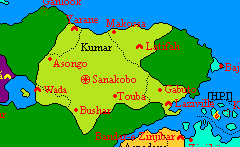Kumar: Difference between revisions
No edit summary |
|||
| (6 intermediate revisions by the same user not shown) | |||
| Line 3: | Line 3: | ||
|commonname = Kumar | |commonname = Kumar | ||
|flag = File:Kumar flag.png | |flag = File:Kumar flag.png | ||
|coa = | |coa = File:Kumar Shield.png | ||
|motto = From the Desert, We Rise | |motto = From the Desert, We Rise | ||
|anthem = | |anthem = <br />"Baba Yetu"<br/>{{small|("Our Father")}}<br><div style="display:inline-block;margin-top:0.4em;">{{center|<youtube width="200" height="120">https://www.youtube.com/watch?v=PCa8RxaOPW8</youtube>}}</div> | ||
|map = | |map = File:Kumar Map.png | ||
|mapversions = | |mapversions = | ||
|capital = | |capital = Sanaboko | ||
|largecity = | |largecity = Gabuto, Latifah, Wada | ||
|lang = Kumari <small>(national language)<br>Istvanistani, Babkhi, | |lang = Kumari <small>(national language)<br>Istvanistani, Babkhi, Mbasani <small>(regional languages)</small> | ||
|religion = Animism, local cults | |religion = Animism, local cults | ||
|demnoun = Kumari | |demnoun = Kumari | ||
| Line 41: | Line 41: | ||
}} | }} | ||
'''Kumar''', or the '''Kingdom of Kumar''' (Kumari: ''Ijobi Kumar''), is a federative kingdom in Northern [[Eura]]. The Kumari kingdom includes the realm of [[Mbasana]]. | '''Kumar''', or the '''Kingdom of Kumar''' (Kumari: ''Ijobi Kumar''), is a federative kingdom in Northern [[Eura]]. The Kumari kingdom includes the realm of [[Mbasana]]. | ||
==History== | |||
The tribes of Kumar rose following the demise of [[Babkha]] that left an immense power vacuum on the Euran continent. In the first decades, the Kumari people were highly dispersed. While other states, such as [[Constancia]], emerged rather quickly as a consolidated nation, the Kumari remained a tribal culture. The first organised Kumari state was Mbasana, which was established as a reaction to the [[Euran War]], which forced some Southern Kumari tribes to unite in a state structure. Mbasana was a highly instable political entity. Since its establishment, the country has been in a perpetual state of civil war, with the Mbasana People's Party feuding with the main opposition, the Liberation Front of Mbasana. Paul Lamola, one of the few Kumari leaders who had been educated at an University. | |||
The country was devastated by predatory raids carried out by Constancia in the aftermath of the Second Euran War and sank even further into an all encompassing poverty from which the only relief came as serving as the entrepôt for illicit goods being smuggled into and out of the Bathani dominated interior of Northern Eura. With each passing year Paul Lamola would grow more and more dependant upon a clique of Baatharzi merchants to the point where, by 1675, control of the capital of Gabuto had passed into the hands of Bathani clansmen. | |||
The Kumari nations joined [[Azad Eura]] during the [[Second Euran War]] in an attempt to oppose Raspur domination of Eura and to keep some degree of independence. The establishment of the neo-Babkhi state of Raspur and later the [[Suren Confederacy]], forced the Kumari tribes to unite and led to the establishment of the Ijobi Kumar, or the Kingdom of Kumar. | |||
==The Five Realms== | |||
The Kumari Kingdom is divided into five realms (''Ijubo''), each governed by a viceroy who represents the Ayuba. The five Ijuba of Kumar are: Sanakobo, Mbasana, Latifah, Ashad and Barato. | |||
Latest revision as of 18:46, 17 August 2020
| Kingdom of Kumar Ijobi Kumar (Kumari) | |||
| |||
| Motto: From the Desert, We Rise | |||
| Anthem: "Baba Yetu" ("Our Father") | |||

| |||
| Map versions | |||
| Capital | Sanaboko | ||
| Largest city | Gabuto, Latifah, Wada | ||
| Official language(s) | Kumari (national language) Istvanistani, Babkhi, Mbasani (regional languages) | ||
| Official religion(s) | Animism, local cults | ||
| Demonym | Kumari | ||
| Adjective | Kumari | ||
| Government | Federative Kingdom | ||
| • Ayuba | Malia II | ||
| • Chief Kambala | Moses Beshar | ||
| • High Shaman | Iwo Obeja | ||
| Legislature | Kala Ayubada | ||
| Establishment | 1650 (Mbasana) | ||
| Area | |||
| Population | 14,000,000 | ||
| Currency | Gold | ||
| Abbreviation | KUM | ||
| Driving side | right | ||
| Time zone(s) | CMT | ||
| National animal | Desert Panther | ||
| National drink | Twogo Beer | ||
Kumar, or the Kingdom of Kumar (Kumari: Ijobi Kumar), is a federative kingdom in Northern Eura. The Kumari kingdom includes the realm of Mbasana.
History
The tribes of Kumar rose following the demise of Babkha that left an immense power vacuum on the Euran continent. In the first decades, the Kumari people were highly dispersed. While other states, such as Constancia, emerged rather quickly as a consolidated nation, the Kumari remained a tribal culture. The first organised Kumari state was Mbasana, which was established as a reaction to the Euran War, which forced some Southern Kumari tribes to unite in a state structure. Mbasana was a highly instable political entity. Since its establishment, the country has been in a perpetual state of civil war, with the Mbasana People's Party feuding with the main opposition, the Liberation Front of Mbasana. Paul Lamola, one of the few Kumari leaders who had been educated at an University.
The country was devastated by predatory raids carried out by Constancia in the aftermath of the Second Euran War and sank even further into an all encompassing poverty from which the only relief came as serving as the entrepôt for illicit goods being smuggled into and out of the Bathani dominated interior of Northern Eura. With each passing year Paul Lamola would grow more and more dependant upon a clique of Baatharzi merchants to the point where, by 1675, control of the capital of Gabuto had passed into the hands of Bathani clansmen.
The Kumari nations joined Azad Eura during the Second Euran War in an attempt to oppose Raspur domination of Eura and to keep some degree of independence. The establishment of the neo-Babkhi state of Raspur and later the Suren Confederacy, forced the Kumari tribes to unite and led to the establishment of the Ijobi Kumar, or the Kingdom of Kumar.
The Five Realms
The Kumari Kingdom is divided into five realms (Ijubo), each governed by a viceroy who represents the Ayuba. The five Ijuba of Kumar are: Sanakobo, Mbasana, Latifah, Ashad and Barato.

